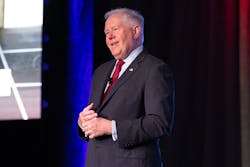Air Force, Industry Discuss Sustainment and Supply Chain Needs in a World With True Competitors
By Paul Shirk, 72nd Air Base Wing Public Affairs
Almost 2,000 aerospace representatives and defense officials recently gathered near Tinker Air Force Base at the Reed Center at Delta Hotels for the 17th annual Tinker and the Primes conference.
The conference was hosted by the Midwest City Chamber of Commerce and provided the opportunity for prime and secondary contractors, government agencies, academic institutions and small businesses to come together to discuss how they can help sustain America’s ability to generate airpower.
Air Force keynote speakers at the conference spoke about competition with China, the importance of supply chain management, enterprise digital dominance as well as updates on Tinker AFB’s growing missions.
“The thing we have to get used to in general is that we’re now living in a world in which we have a true competitor who is challenging us,” said Secretary of the Air Force Frank Kendall. “I spent 20 years worrying about the Soviet Union; they were a significant and real threat, and they were a serious adversary. China is more formidable to me by far than the Soviet Union ever was. They’ve got better resources, they’re more open-minded about buying technology, they’ve got much better manufacturing capability and they’re being very aggressive and single-minded about pursuing things that are very thoughtful and designed to defeat our ability to project power.”
Kendall detailed his Seven Operational Imperatives, stating that they are things that must be done to be successful operationally when projecting power. Several of his imperatives have a direct tie to missions carried out by Tinker AFB units.
Commander of Air Force Materiel Command Gen. Duke Z. Richardson, then spoke about AFMC’s approach to accelerating the acquisition materiel lifecycle, Digital Materiel Management.
“We take what’s gone on in NGAD [Next Generation Air Dominance], B-21 [Raider], Sentinel, to varying degrees and we try to see if we can scale it and turn it into what we call an enterprise solution,” Richardson said.
He added, “This concept of One Team, One Fight that the secretary talks about, we are really trying to implement that inside Air Force Materiel Command.”
Richardson detailed the DMM’s six levers: instilling a digital-first culture, developing digital strategies, structuring and securing data, DMM tools access, training a digital workforce and modernizing IT infrastructure.
Air Force Sustainment Center Commander Lt. Gen. Stacey Hawkins spoke about the importance of people and recruiting to the center.
“Without the people of the Air Force Sustainment Center, producing to promise doesn't happen,” Hawkins said. “Our people govern and execute our processes. And our ability to attract, recruit and retain the next generation of people to carry us forward is going to be vital to our existence.”
Hawkins added, “If you're playing at an elite level, you are starting to recruit kids as early as junior high school. That's what we're going to have to do, particularly as we're looking at what our software workforce needs to be in the future. We have depended on the product and the output of universities producing software engineers for many years. We have a requirement to hire every single software engineer that graduates from the state of Oklahoma.”
Oklahoma City Air Logistics Complex Commander Col. Brian Moore, spoke about the state of the OC-ALC and its abilities
“We have the tools, and the will, we’ve got to commit to improve our partnerships and get after production with one caution,” Moore said. “China is focused on manufacturing; they are investing in their industrial capability and technologies as well; so, as we move forward, we must partner to ensure our advantage isn’t diminished.”
Moore also spoke about the current state of the OC-ALC, while stating his goal for what the complex could look like by the year 2050.
“Our intent for the complex is to adapt the reality of increased automation, big data, smart interconnected machines, and greater productivity,” Moore said. “We need to work together to find appropriate opportunities and mechanisms to share data and collectively transform to industry 4.0 expectations.”
Tinker and the Primes is produced by the Midwest City Chamber of Commerce in collaboration with Tinker AFB and aerospace industry partners.
